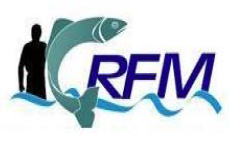At its annual meeting, the Caribbean Regional Fisheries Mechanism's (CRFM) scientific body evaluated fisheries health and economic performance in Jamaica, Guyana, Montserrat, Suriname and the Eastern Caribbean, and tested new analytical and decision-making tools that will help take into account climate change risks.
 30 June 2012: The Caribbean Regional Fisheries Mechanism’s (CRFM) scientific body evaluated major fisheries in the region to determine whether natural fish populations remain healthy and where fisheries management controls are necessary.
30 June 2012: The Caribbean Regional Fisheries Mechanism’s (CRFM) scientific body evaluated major fisheries in the region to determine whether natural fish populations remain healthy and where fisheries management controls are necessary.
The eighth annual Scientific Meeting met from 20-30 June 2012, in Kingstown, St. Vincent and the Grenadines, with fisheries scientists from 12 of 17 CRFM member States participating.
The Eighth Meeting evaluated the health and economic performance of Jamaica’s queen conch fishery and Guyana and Suriname’s seabob (shrimp) fisheries, and performed the first steps in assessing the health and performance of Eastern Caribbean blackfin tuna (bonito) and the reef fisheries of Jamaica and Montserrat.
The Meeting also considered a subregional management plan for flying fish in the Eastern Caribbean developed by a technical group formed by CRFM and the UN Food and Agriculture Organization’s (FAO) Western Central Atlantic Fishery Commission. If implemented as planned in 2013, the subregional plan would be the first implemented jointly by Eastern Caribbean countries.
The Meeting also tested new data analysis and decision-making tools that could allow the region’s scientists a broader data set for evaluations. Among other things, the new tools are intended to take into account risks posed by climate change and to better assess potential impact of proposed management measures on the well-being and livelihoods of affected communities.
The CRFM is an intergovernmental organization created by CARICOM in 2003 “to promote and facilitate the responsible utilization of the region’s fisheries and other aquatic resources.” Its 17 member States are Anguilla, Antigua and Barbuda, the Bahamas, Barbados, Belize, Dominica, Grenada, Guyana, Haiti, Jamaica, Montserrat, St. Kitts and Nevis, St. Lucia, St. Vincent and the Grenadines, Suriname, Trinidad and Tobago, and the Turks and Caicos Islands. [IISD RS Sources]